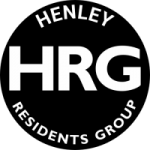Formation of Henley Residents Group
Henley Residents Group (HRG) was formed in 1989 due to an unpopular town centre development (Waitrose planned to increase the store size, demolishing the old Regal Cinema), leading to a local residents’ campaign.
HRG Leader Gill Dodds says:
“One of the big concerns was that the District Council was part applicant and so in effect giving itself planning permission. A public meeting was called in the Town Hall and the author and playwright John Mortimer chaired the event. We invited all the SODC politicians and planning officers but none came. Instead came hundreds of Henley residents. The hall was full to overflowing and a second impromptu meeting was held on the Town Hall steps. There was genuine anger at what was being forced on the town…
…We held a march through the town and again hundreds of people joined us. We delivered a petition to 10 Downing Street with thousands of signatures. We lobbied Michael Heseltine our MP who was also Secretary of State for the Environment, but no one listened, and the town centre development still looked as though it was going ahead. Then we hit on the idea of a Parish Poll. We asked the town if they wanted the development, and also asked the question ‘Do you have confidence that Henley is being properly represented by its councillors?’ 79% voted no to the development and 84% said they had no confidence in their Councillors. That was a clear message that HRG had to take the next step and stand at the election May 1991.”
Eight Town Council seats were won, and also three at district council. It was an extraordinary result. HRG had moved from lobbying as a group of concerned townspeople to running Henley Town Council. Consequently, the original plans did not go ahead – instead Waitrose built a much more modest scheme to include a replacement cinema, with three screens – the Regal we enjoy today.
Except for one break, HRG retained control of the Town Council until 2015, but regained control as a result of bye-elections in 2017. Also it currently has one seat on each of South Oxfordshire District Council (SODC) and Oxfordshire County Council (OCC).

